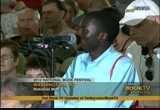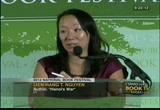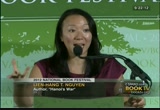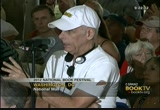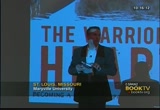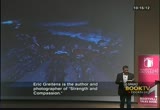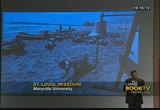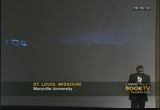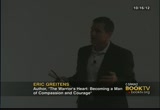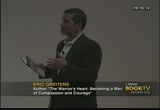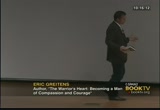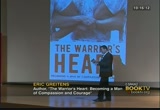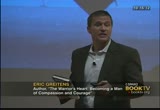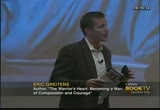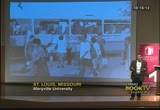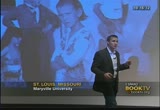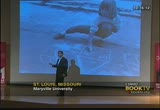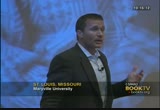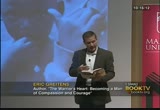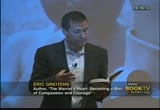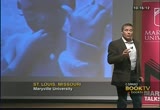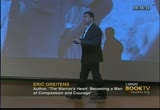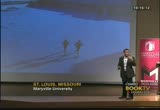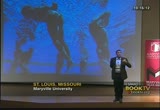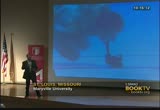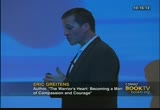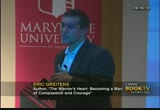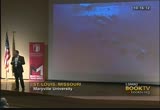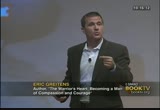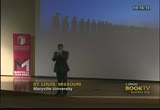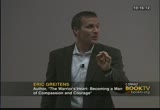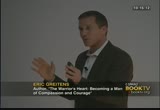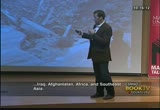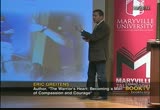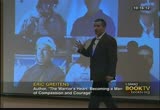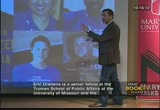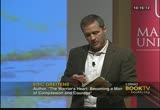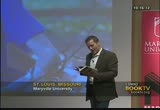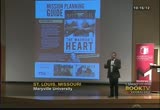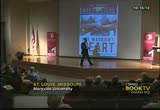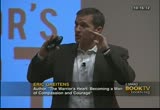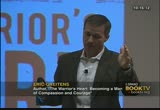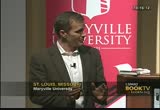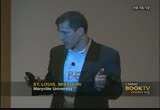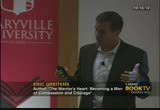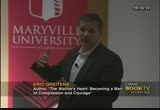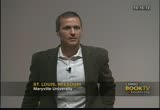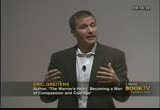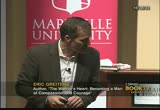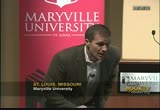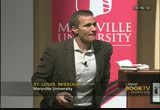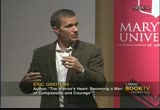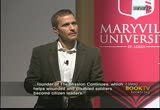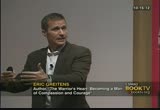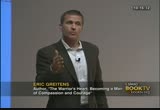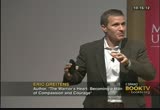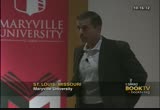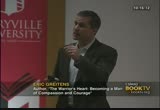tv Book TV CSPAN November 3, 2012 2:00pm-3:00pm EDT
2:00 pm
of analyze what was going on in 1968? i did come across documents that the north vietnamese leaders were saying we hope humphrey wins and we should try to help him win. nixon, we would get terrible terms under nixon, and they realized that too late to launch -- trying to help humphrey, and instead the u.s. allies ..n saigon were much here calculating and worked to help nixon win, and he won be a very razor-thin victory. >> thank you very much for your good work. i have a question about the intelligence reports, because
2:01 pm
before the united states goes into a war with any country, they have to go to the d based on intelligence report. so my question is, is there any politics like on the intelligence, from the intelligence, or they get -- just didn't get it right? >> we just found out ha >> we just found out recently in the national security archives, some thing like two years, if you look at the goal of tonkin documents, like the attack never happened. this gave lbj the blank check to wage war in vietnam. he knew north vietnamese could not carry out the second attack and so again you can see so many similarities with what happened with the war in iraq. in short, what i can say is the
2:02 pm
gulf of tonkin documents reveal that they were doctored. >> was it benefit of hindsight and research, were there any policies or strategies the united states could have adopted at the time to change the outcome and achieve the political objectives? >> there are two types of historians. historians who love to play with counterfactuals and those who don't like it. it is a good question and i would say no. even though i say that in certain ways the unsung heroes of my book are coach team in and bobbling zap. they were moderates in the war and would be incredible to think how different the war would have been had they been involved. it would have been far less bloody for vietnamese communists but there was no way we could have unseated him.
2:03 pm
so even though one of the things his detractors kept pointing to was the damage the american bombing was doing in north vietnam. had we been more supportive of the peaceniks and moderates in north vietnam would that have forced them to the negotiating table earlier, but that is the only thing i could say, that we paid more attention to the internal party politics of what was going on, that would have opened up. >> one more. >> you may have partially addressed this question and may not want to answer from your previous response. i see a lot of parallels between vietnam and afghanistan supporting, installing,
2:04 pm
supporting a corrupt government. a war of insurgency. one minute they are plowing their fields and the next minute they are shooting. misguided policy, would you care to draw any other parallel observations? >> if you -- i can get your e-mail address and send you my new york times op-ed which does more comparisons and answer a few of them for you. >> time has run out but for those who still have questions i can take some so thank you very much for coming. >> tell us what you think of our programming this weekend. you can't reach us at booktv. comment on our facebook call or
2:05 pm
send us an e-mail. booktv, nonfiction books every weekend on c-span2. up next, eric greitens talks about his book "the warrior's heart". an adaptation of his memoirs of becoming a navy seal. this is just under an hour. [applause] >> a round of applause. thank you very much. one of the things that is fun about being here, i am from st. louis. it is good to do these things. i have some wonderful people who saved my life, my second grade teacher is with me tonight.
2:06 pm
welcome hats. [applause] >> if this book can have the kind of defect on one person's like that hat and my other teachers had on me it will be a very successful books so thank you for being out here tonight. i appreciate it. i will begin the book reading from the beginning where i asked young people to imagine themselves in a navy seal training and this is how it starts. you stand in freezing water up to your chest. every muscle in your body throbs with pain. you are exhausted beyond anything you could ever imagine and all around you the night air curses and groans and others who are getting it out like you, trying to survive the night. most won't. you know the statistics. one in ten will make it through this week, will survive hours and days as the punishment requires you to become a navy seal.
2:07 pm
water is dark around you, remember your instructors words as the sun drifted for the orion, voices booming over the bull horn. say goodnight to the sun. the night is going to be a long night. imagine another hundred hours of this. you see yourself plunging over and over into the icy water, pulling yourself out again. imagine endless repetition of set ups, pushups, torture, when they leave you in freezing water not just for a few minutes but for five more days. five days of struggle and uncertainty, physical and emotional torment separating the iron will from the merely strong. in the distance, a bell sounds three times and then another three times. if you here the bell you know
2:08 pm
another student has chosen to quit. a voice rises and falls, haunting you, inviting you to do the same. click now and avoid the rush later. one by one, sometimes in clusters other students surrender. all around you, all around you they climb out of the ocean and walk up the hill and ring the bell. for then it is the end. the others in your crews struggle along with you and their companionship and strength buoys you. you are a chair for one another. you are a team and you do not want to quit on your team but you are bone tired and shivering. you are afraid you will never make it through the night alone an entire week. on shore in the brightly lit tent, others are gathered inside. they are wrapped in blankets. they are warm.
2:09 pm
you could be one of them. all you have to do is rise out of the icy water and walked toward the tent. students have been doing it all night. just get up, get out, walked towards the bell and quizzed. then you could be warm and dry like the others, you could feel your fingers and toes all you have to do is get up, get out and ring the bell. what do you do? this was just one of the tough choices we had to make when we were in the navy seal training. in the navy seal, one thing we talked about when you have to make tough choices is how to make tough choices on the front lines. in the military we talk about the front line as a place you coming contact with the enemy. the place where you are most challenge. yet the fact is every person, every young person has in their
2:10 pm
life -- for young people from line is the place where they come up against fear, hardship, difficulty and on the front line it is important for young people to finally navigate those challenges successfully. when you make the right kinds of choices on the front lines if all of them have an opportunity to create themselves we create ourselves on the front line because it is the place we can grow and if we make the right choices we all have an opportunity to become people of compassion, we have an opportunity to become people of courage and we have an opportunity if we make the right choices on the front line, we have an opportunity to develop our gifts and strengths and abilities so that we can find a way to be of service.
2:11 pm
if you think about how you make those decisions, one of the things we do in the navy seal team is an analogy how you make tough choices on the front lines. we talk about how you use a compass. what we know is if you take a compass and point it in a particular direction you can walk all day and walk over mountains and walk through a forest or a desert and what happens is at the end of the day you end up in one very particular place. we also know at the beginning of that journey you make a decision that you are going to make a change of course. just one or two degrees in your life, you decide to make a change of course of one or two degrees and what the new pact you can walk over mountains or through a forest or a desert, what happens is that the end of the day you end up in a completely different place.
2:12 pm
we know for the young men and women who we are working with today and for those who are going to read "the warrior's heart," i know for them there in a place there facing a front line in their life and their challenge and they should face charge it and difficulty and have to act with courage and i have written "the warrior's heart" so that they can think about how to make choices in their life so that over time they can make choices and create themselves so they can become people of compassion, that allow them to develop courage in their lives and also make choices so that they all get to a place they can figure out how to use their own ability, develop their own talents, develop their own strength so that they can be of service to the people. in our lives none of this happened on our own. as i mentioned, not only is
2:13 pm
patch here but in the book, i dedicate this book to my teachers, at parkway junior high and parkway north high school who all shaped my life and what i know for sure is we all have to have the right kinds of teachers and role models and in "the warrior's heart" i tried to put in lots of stories about teachers and role models who can help young people think about how we make tough decisions on our own front lines and one of the people who shaped my life who i write about in "the warrior's heart" was one of my mentors, bruce carl who ran a program called youth leadership. when i was 16 years old bruce carl invited me to go down to work in a homeless shelter in downtown st. louis. as a kid i have done a lot of community service work and i had done some things that a homeless shelter but what bruce said to me is not only are you going to go down to the homeless shelter but i'm going to take you and
2:14 pm
other students down and i am going to ask you to spend the night. and spend some nights in the homeless shelter and what bruce said is it is important for you to understand how all of your neighbors live. it is important for you to understand how all of your neighbors live. one of the things i tried to do in "the warrior's heart" is i asked kids to step into the shoes of rwanda refugee children and children of the streets of bolivia and navy seals and think about the choices they would make so they can exercise their moral imagination and think about the world. one of the things bruce did that was powerful for me was bruce also said to me it is important to understand how your neighbors are living because you can do something about it. and after you graduated from high school. didn't say you could do something about this after you graduated college.
2:15 pm
or after you turn 30. the message bruce gave me at the time is you can do something about it right now. part of the message i wanted to give an "the warrior's heart" is they have the ability to make a difference in their school and have the ability to make a difference in their communities and an ability for their strengths and talents to make a difference. i know from the experience i had doing internationally humanitarian work the incredible difference people can make in their world. one of the stories i write about in "the warrior's heart" was my experience working with bosnian refugees. the photograph i took here, and as they step off of the bus into the refugee camp. and what they ever owned. and the material position they
2:16 pm
lost friends. and what it would be like if you have lost your home. and if you lost everything in your room, and start a new life. and a lot of people and the refugee camps, and on the new front line, a lot of choices that they had to say. it was hard for the young people because they felt their life had been cut short. and they lost friends and families and felt their life was in control but they did it like anybody else was counting on. they didn't feel they had any
2:17 pm
social purpose and the kids who were doing the best in the refugee camp were often young people, 12 or 13 years old who made a decision they were going to volunteer. they started to work with the youngest kids in the camp. you think for a second about what it is like to make sure we are able to provide a quality education to every single young child in st. louis. think about how difficult that is and what the challenge is like in a refugee camp and what that is like, no classroom or curriculum or buildings. parts of the reason they were able to do that successfully is a lot of young people stepped forward and said i am going to find a way to volunteer and one of the lessons in "the warrior's heart" is if you are at a place in your life where earnings are difficult and you might be afraid, you actually become stronger when you find ways to be in service with schools and
2:18 pm
in service in your community and in the world not only does it help the people around you it makes you stronger. what was needed was how this started to take off in the refugee camp. one boy was 15 years old and had no budget, no supplies. all he had was one sucker ball and set up a soccer team for younger kids in the camp. one message that we want to get across in "the warrior's heart" is it is a message for young people, you can find a way to serve right now in this tough place. if all you have is the soccer ball there's a way for you to serve. if paula was confined way to serve no matter the circumstances we find ourselves in you can find a way to make a contribution. i walk young leaders for a lot of adventures in my own life and one of the places i take the ms.
2:19 pm
rwanda. i was working in rwanda in 1995 couple months after the genocide many of you remember between 800,000 to a million people were killed. i went through to work specifically with unaccompanied children. these are kids who have lost their parents during the genocide or been separated from their parents during the refugee movement. again i asked young leaders to think about their own experience and imagine themselves if they were up rwanda refugee child who was living in the camp. these four boys you are looking at were part of a group of 15 boys who were all living together and alone in a refugee camp. i asked readers to imagine themselves as part of this group. you learned what you need to do to survive. you created a shelter for yourself. you were healthier than so many
2:20 pm
at is an grab food and water when it was given out, hiding them away for when the supply runs dry. one day as you lie in the shadows of the knee that stand between you and the blazing sun you hear a sound. rollover and press your hands against your years but the sound reaches you still. it is a little child crying. you rise and leave the comfort of the shade. in front of your shelter stand two little boys. they are barely clothed and there is dust on their faces. their mouths are open like a baby birds crying and scared. you can take him into your shelter and share what little you have. you could help drive their tears and give them water and make sure they're not injured. you have yourself to worry about too. you have yourself to worry about too. everything you give them is something you take from yourself. if you don't offer they might
2:21 pm
find help elsewhere or they might die. the sun beats down hard. they stand and look at you. you could yell at them more scare them away or stand aside and let them in. what do you do? what do you do? we ask young people to imagine themselves in that tough situation and think about what they would do. one message we have for young readers is many of them might not necessarily be in a situation right now where they have to make life-and-death decisions about actually saving other people's lives but all of them are in a position today where what they do can shake the life of other people around them in their classroom, schools or communities. they have an opportunity to make a difference in the lives of others. the way they do that, one way we suggest they do that is think about the lessons that i learned. this group of 15 boys was led by
2:22 pm
a 16-year-old. one of the things we write about in the book is when i asked the 16-year-old boy to tell me about all the other kids who were in the group i will never forget he said to me this one is powerful with fire and the soldiers from his i year or -- as he went around the group he describes every single boy as being powerful in some way. there i saw part of the power of his achievement. think about what that 16-year-old boy was able to do to keep 15 boys together and alive through deprivation in the camp and the only reason i think he was able to do that so successfully at this place in his life where he was facing difficulty and pain and hardship the only reason he was able to walk that path was because for him he knew he didn't have to walk it alone. he was walking, in his case,
2:23 pm
these other young boys and truth humility that allowed him to look at every single person around him, every single person could contribute in some way. that was part of the power of his service. for me in my own journey as we take young leaders through, one of the things as we leave places like bolivia and cambodia where i did international humanitarian work i take him into the navy seals training and for me when i left but humanitarian work and went to navy seal training, but it stands for basic underwater demolition fuel training. some of you might have heard of it. basic navy seal training is often considered to be the hardest military training in the world. in class 237 we started with 220 people in our original class and by the time we graduated we were down to 21. what happened over the course of training is every single day
2:24 pm
they hit you with a different challenge so i take young leaders through several challenges. they asked you in the first week to come to the edge of the pool, jump in, do a front flip underwater and swing 50 meters underwater. one of the first challenges in the first week of training. later they ask you to swim down 50 feet and come back up. do firemen drills where you throw somebody over your shoulder and run with them down the beach, throw somebody over your shoulder and run with them through a path in the mountains. they ask you to land small rubber boats on jagged rocks often in the middle of the night and one evolution is called brownproofing. they tie your feet together and then tie your hands behind your back and with your feet tied together and hands tied behind your back you jump into the pool.
2:25 pm
with your feet tied together at your hands tied behind your back you have to swim 50 meters. come back from swimming 15 meters and what they ask you to do is sink to the bottom of the pool. and then sink back down. the next thing they asked us to do, when they first told us we had to do it i actually laughed out loud because i thought they were kidding. the next thing we're going to take your face mask and throw it in the water. it will sink to the bottom of the nine foot section and with your feet tied together and your hands tied behind your back you will swim to the bottom of the full, grabbed a face mask with your teeth and swim back to the surface and back down five more times. when you have to do things like this the instructors would always call them evolution. the instructors would say the next evolution is drownedproofing or the 50 meter
2:26 pm
swim or the four mile run, i had no idea why they were always calling them evolutions. why not call them the next challenge for the next really painful thing we have to do? finally one of the instructors explain why they called them evolutions. what he said was everytime you are on the front line and you make a decision, a voluntary decision that you will confirm your fear, what happens is your character evolves. every time you make a voluntary decision your going to move through pain rather than solve a larger purpose your character evolves. when you make a voluntary decision you are going to do something hard or difficult or might even suffer in order to become stronger, what happens is your character evolves? the idea was you are going to
2:27 pm
create evolution after revolution after revolution so that eventually all of us get to a place where character had evolved and we become navy seals and as navy seals we can find a way of being of service to the people. what i know for young people, it is true for all of us, if we think about what it actually takes to make tough choices and so we can develop compassion and develop our own abilities to be of service to other folks, when we walked this path is going to be hard. we will not be successful every day. it will be difficult and we will run into hard ship and we will be afraid but if you move through that year we become courageous and achieve wisdom and if we move to the things we are suffering we become stronger and every young person through a process of evolution can come to
2:28 pm
a place where they develop strength, courage, wisdom and they can use that strength and courage and wisdom to be of service to the people around the moon. as you continue with the training the pinnacle of the training comes in a week that is considered the hardest week of the hardest military training in world. it is a week that is called hell week. the average class leaves for a total of two to five hours of the course of the entire week of training. as you are going through the training they have you doing things like physical training on the beach with logs that way several hundred at the sand racing teams in and out of the ocean. water off of the coast of san diego as you know, regardless of season is often in the low to mid 50s. make sure you have plenty of time to appreciate the water. running the obstacle course throughout the week and it is a week of constant chaos and
2:29 pm
change and challenge and confusion. if you ever want to quit at any time in the week all you have to do is raise your hand and say i quit or you can raise your hand and say i dropped on request. or there is a small bell and if you walk over to the bell and ring it three times it means you quit. what instructors do is rig up this little contraption so that wherever the class when the bell would follow. if you ask the instructor is why do you do that? what follows around with the bell and never make it is more than 30 or 40 yards from the class? instructors tell you they will say we do that because we believe in excellent customer service. what they do is follow you around and up with who's bell and i can remember what was for
2:30 pm
our class the hardest moments of the hardest week of the hardest military training in the world. the moment came at the beginning of the second night. for a lot of people adrenaline had carried them through the first night and we arrived at the beginning of the second night and we are thinking i am more tired and more exhausted than i have ever been in my entire life and we are thinking i cannot believe this is only the beginning of the second night. at which point one of the instructors get on their bullhorns and say that is right, gentlemen. it is only the beginning of the second night. what they did at the beginning of the second night is to class out and lined us up on the beach to watch as the sun was setting. they all lined up on the beach to watch as the sun was setting and as the sun was going down the instructors came out and got on their board and started to get inside people's minds. they said say goodnight to the
2:31 pm
sun, gentlemen. tonight is going to be the most painful night of your life. this week just gets more miserable as we go. i remember i was standing there and i saw out of the corner of my eye that something broke in the class. people started running for the bell. running for it. you could hear it going off. we had more people quit our class at that moment than quit at any other time in all of the training. this was what was amazing about that moment. i told you about the difficult things they asked you to do. some 50 meters underwater and swim down 50 feet and i am not anti your feet together and and be on your neck and make you jump in the pool. who would have fought the hardest moment of the hardest week of the hardest military training in the world would come when all they actually asked us to do was stand on the beach and
2:32 pm
watch the sun sets. that is all we had to do at that moment was stand on the beach and watch the sunset. i always ask how many times have you been able to go out and stand and watch a sunset? what they know this is every one of us can stand and watch a sunset. what was interesting about this moment is from 220 people to 21 i can count on one hand the number of people who i saw quit when they were actually doing something. what happened is people would quit when they started to think about how hard it was going to be. that is when people would quit. when they started to imagine how hard it was going to be that is when people would quit. one of the things we know is the case is when we think about doing things we are afraid of, what it takes to challenge ourselves on the front lines and move through our cit and difficult one of the lessons is
2:33 pm
one of the things we need to do is find a way to take it one step at a time. if we confined to wait to take it one step at a time as we confront our fears and do our work all of us can find a way to make it through those things that are difficult, develop our own abilities, become people of compassion and courage and find ways for us to be of service. when i finish with navy seals training i deployed four times and went to afghanistan and southeast asia and the horn of africana and iraq. in "the warrior's heart" i talk a little about my experience in iraq where i was on the front lines and in march of 2007 i was serving as commander of al qaeda targeting still in iraq. my unit's mission was to capture mid and senior level al qaeda leaders in and around the city and in march of 2007 my team
2:34 pm
came under attack with a mortar attack in the morning and after several more rounds went off there was a suicide truck bomb. when the suicide truck bomb went off it ended up taking out the entire western wall of our barracks. that day, out later that day i was taken to the surgical hospital with minor injuries. 72 hours later i was able to return to full duty. what also happened flaws some of my friends were hurt a lot worse than i was and one of the things is for a lot of people i went to visit, when they came home i saw they were on this new front line. these were veterans, strong people who served in iraq and afghanistan and they came back and especially after they had been injured, they were on a new front line and had to make a decision about the direction they were going to have. they had to make a decision how they were going to deal with
2:35 pm
pain and work through difficulties and hardships to find ways to be of service at home. all of the men and women i talked with, i went to bethesda naval hospital and started talking with young men and women and people who lost both of their legs and talked with one young man who lost the use of his right arm, talked with another lost most of his hearing and when i asked what do you want to do when you recover, every single one of them said i want to return to my unit. the reality was for a lot of those killed 2 and women they were not going to return to their unit. the reality was on this new frontline of these implants women who had come back from service wanted to find a way to continue to serve. i took my contact pay from iraq. two france put money from disability checks and used that to start the mission continues. we started with the intention of
2:36 pm
challenging veterans who had come home to find ways on the new front line in communities across america to continue to serve and inspire. we work with men and women like jos from st. louis, missouri with traumatic brain injury. men and women like shawn donahue, amanda haydn writer who was hit by mortar round and ian smith who had post-traumatic stress disorder and melissa simon who came back with post-traumatic stress disorder. and was shot by a sniper. adam burke from florida was hit by a mortar round. what we share with young people is they were at a place in their life that they came back to their communities and were on a new front line and many were afraid and it was difficult. what we did with them at the mission continues was challenged them. we challenge all these men and women the same way we challenge
2:37 pm
young people in the warrior -- in "the warrior's heart". we challenge them to continue to serve. adam burke was hit by a mortar round and set up his own nonprofit called veterans, julien miller served with habitat for humanity. on donahue became a huge hockey coach and football coach. ian smith did a fellowship at the mission continues and internship in the white house with the first lady's office for her joining forces initiative. melissa steinman became a biology teacher for part of her fellowship and what happened was they started to serve again and took on this challenge of finding a way to continue to serve on their new front line. what we found that the mission continues is it all of them served as an inspiration for young people around the country, i finished the book with this challenge for young people.
2:38 pm
you pause over the last page, your own life is filled with possibility. you think about the story you might tell one day about your life, your love, your service, your adventure, the road before you is long. you wind up in steve hills and low valleys. there will be moments of spectacular beauty along the way and times of deep pain but as you take each step you have the opportunity to create yourself. you have the opportunity to become compassionate, to become courageous. you have the opportunity to become committed to causes greater than yourself. you will be inspired and you will inspire others and you will find your own unique path. world needs you. we need all of your strength and creativity and heart. you can make a positive difference in the the lives of
2:39 pm
others. take it one step at a time and know that it is up to you. the world is waiting. what will you do? my final note to all of you young readers is go be great. and then i offer them in the last chapter, your mission. i tell them that they are at the heart of this book and i wrote it with them in mind and i direct all of them to a mission planning guide we have set up that accompanies the book. the young people around the country can figure out how they take their skill and passion and interest and turn the things that they loved and the things they care about in to their mission of 70 in the community and country. one of the things we are trying to do is help young people do what we all need to do in our lives, find their own vocation. we talk about vocation as the
2:40 pm
place where your great july meets the world's great needs. what we know is if youngoy meets the world's great needs. what we know is if young people start at a young age to create a life of purpose where they become courageous and compassionate. we also know this is only possible, it was possible in my life because of wonderful futures so we built the teacher's guide to help teachers teach this book and teach some of these lessons to young people and really spread this message all of them are capable of creating themselves and all of them are capable of making a contribution. one of the most fun things i have had a chance to deal with over the course of the past week is talk to young people around the country about "the warrior's heart". for me it has been tremendous and i am grateful to all of you for coming out to share this day with me. [applause]
2:41 pm
>> we have time for some questions. i would be happy to take some questions from the audience. >> hello. how does a humanitarian in situations of such tremendous loss particularly with young people become inspired to pursue a mission as a highly trained military assets for the u.s. army or the u.s. navy? >> great question. part of it, i right about this in the book. there was one moment i was in bosnia and in a shelter in a refugee camp and i was with one man whose own family had suffered tremendously. i was in the shoulder with him and he said to me i appreciate the fact that you are here.
2:42 pm
don't get me wrong. i appreciate that there is a shelter for my family and appreciate the fact my kids can go to kindergarten and there is food here but he said if people really cared about us they would be willing to protect us. i didn't know what to say to him at the time. i was only 20 years old but i remember reflecting on that later and realizing what he said was true. if there's anything in our life we really do love, really care about we are willing to respond with care and compassion. but the things we care about in our lives and the things we love we are also willing to act with courage, we are willing to protect people and willing to love them in that way. i started to think about what it meant to care about something and live a life with compassion and courage and i became convinced during my time in bosnia and rwanda that there were times when people with strength needed to step forward and use that strength to protect
2:43 pm
other people. that got me thinking about the united states military. i was fortunate both of my grandfathers served in world war ii and i thought about what they had done for me and previous generations had done and that led me to think about the military and finally i joined them until late relatively late. i was 26 years old and harbor desires i had since i was little, desire to jump on a plane and scuba dive and do those things and that attracted me to the navy seal team. all those things shaped my path into the team. >> enjoy your speech. the gentleman came out writing the book that was supposed to be in regard to navy seals about the osama bin laden attack. there was a lot on him and his family. retired navy seal. has this happened to you? >> it has not. what happened in that case was
2:44 pm
there was a very specific mission and concerns about some specific classified and sensitive information that was actually contained in that book. and of course he was part of that mission and there were concerned about threats against him. what we have done in "the warrior's heart" and also -- all the information we shared is publicly available information that happens in navy seal training. we put it together in such a way that we think not just about what navy seals do. and because books are different in that way, we haven't had any problem that we have a tremendous amount of support so it has been a lot of fun. >> how many navy seals are there? >> on active duty, the navy
2:45 pm
seals are the smallest special operations force. at any time there are between 2,000, and 3,000 navy seals and they're not only serving in field platoon on the front lines but also working in places like the pentagon and headquarters command like central command and afghanistan and iraq and those headquarters. probably 2,000 to 3,000 navy seals. they were started january 1st, 1962, by president john f. kennedy. the reason he started the seals was he wanted to have a force, sea, air and land, and no, what president kennedy wanted to do was have a force of people, a highly trained course to put in difficult -- could not only respond tactically but be thoughtful about working in some difficult situations.
2:46 pm
the international relations theory was the flexible response. we needed to respond in a flexible manner to any threat out there and that led to the development of the seal team. >> any comment about that? >> the common on the latest book about the bin laden raid, i don't think that with a good book to write. i will tell you why. one was tremendous respect admiral mcrae then, a four star navy seal admiral in charge of special operations. he took over from at role eric olson, another 4-star navy seal and charges that watered -- special operations command and there were classified and sensitive information in the book and important that we keep that classified and sensitive
2:47 pm
information secret so that we could protect other navy seals conducting operations in the future. the other thing people in the steel community feel is it is obviously fine to write a book. my friend marcus wrote a book and other navy seals have written books to let people know about the force they are supporting that this particular book was about an operation that was the team operation. the concern was this was something an entire team did and because a was a team operation it should have been a story that came out from the team rather than just one person. that was my reflection on the book. did you have a question? >> thank you for your service. the question is do you think with the details you go into on the seals training, any negative
2:48 pm
feedback from the community about proving the curtain back, taking the mystique out of the seals? >> we had a lot of positive comments from people in the steel community about this aspect of the training. admiral eric olson, four star navy seal admiral, i shared the book with him ahead of time and one thing we found is all of the things i talk about art in the basic training, the basic underwater demolition sealed training. there have been discovery channel documentary is done on this training and lots of other videos produced on this training and when it comes to the advanced combat training, seal qualification training, that chapter is much shorter. much slimmer because of this point. it is important a lot of the specific tactics, techniques and procedures they all remain secret. this basic navy seals training is the grueling part of the
2:49 pm
training, where a lot of people are weeded out and also the part that there are a lot of lessons embedded about what it takes to think outside your own tank. that there are other people counting on you, moved through fear and become courageous. i tried to share those pieces of training and all of the advanced training and specific tactics that make procedures remain secret. >> do you have kids? >> what is your name? >> my name is caitlin. >> that is so great of you to ask me. i think you just asked my mom for's question. my mom is right over there. this is the most important question you could have asked. i do not have kids. my wife is here.
2:50 pm
that is my wife. one day, probably soon, we are planning to do that and look forward to that but right now i do not have kids. >> if you had kids would you like them to the navy seals? >> that is a great question. caitlin's question is if i had kids what i want them to the navy seals. the thing that would be most important for my kids is that they do what they would love to do. that would be most important for me. if they came to me and told me this is what they wanted to do, they wanted to be a navy seal i would support them and encourage them in whatever way i could. there are lots of ways to serve. i think every kid should find their own way to be of service but if this is what they want to do i would encourage them and support them. >> thank you. >> you are welcome.
2:51 pm
[applause] >> how long is the seal training. >> what is your name? >> logan. >> about a year and a half to go through basic seal training. i joined on january 20, 2001, and became a navy seal on july 3rd, 2002. when i went through candidate school to basic training advanced field training was the year-and-a-half of training. one of the things we do, logan, we always talk about always being in training leave and what you get -- even when you put that on your chest and the, navy seal we know for all of us the training never ends. we always have to be learning and reading and training and studying. that is part of the commitment of being a navy seal is you are going to dedicate your life to finding ways to continue to grow and learn.
2:52 pm
yes? >> what advice do you have for young people? >> what was your name? kim's question is what advice do i have 3 young people aspiring to be navy seals. one of the things i always say to young people aspiring to the navy seals it is important to them to dedicate themselves to doing really well in school. one thing we know is it is the most highly educated force in the united states military. what we are looking for in the seal teams are not just physical courage and tactical proficiency but people who can be really fought full. emphasized kids should spend a lot of time on their studies and develop their minds, develop those intellectual habits and academic studies. that is important. the second is i encourage young people to get involved in athletics. in athletics, ways to run up against card ship, learned from
2:53 pm
coaches and mentors and role models. that is the second thing we encourage and the third thing we encourage that i always encourage young people to do is find a way to start making a difference and start serving them and if young people can find a way to serve in their community what happens is they start building habits and the habits of team work. the habits of learning what it takes to inspire people in difficult circumstances, the habits it takes to put them in a place where they can one day be navy seals. i'm inspired by young people like will decided to create his own mission and he did. recreated his own mission and went out and chopped firewood and he was able to support the work we do. i encourage young people to spend time studying, get involved in athletics and to find ways to continue to serve in their community. >> in the book you talk about
2:54 pm
physical training. how do you prepare for psychological aspects? post-traumatic stress disorder? how do you prevent that? psychological -- >> great question. we talk a lot about physical training. how do we actually build psychological strain? how do we build the emotional strength so when people go through difficult circumstances there better prepared to deal with situations that might lead to posttraumatic stress disorder. one of the things we found that is really important for dealing with post-traumatic stress disorder is it is important for people to feel connected. when people come, and feel connected and understood and they feel understood by their family and the community and their team. it helps them deal with the symptoms of post-traumatic stress disorder. one of the things that is so difficult is if you add up every
2:55 pm
person who set foot in iraq or afghanistan, add up all the people who set foot in iraq and afghanistan over 11 years it still adds up to less than 1% of the population. of men and women come back from serving in iraq or afghanistan they might return to their community and find themselves in a place no one else has served. no one else has been on the front line or experienced combat and they can feel isolated. one thing we have to do is make sure people are connected to their families, their teammates and the community. that is one thing we have to do. the second thing we found especially at the mission continues is one way to step out of those difficult moments is to create that new mission so that you are not stuck in a place where you are worried about what happened and stuck in the past. we need to create a new mission for people when they come home. we found for our fellows some of whom were in a difficult
2:56 pm
situation and even considering committing suicide and some of whom had serious cases of post-traumatic stress disorder and waking up and looking for rifles under their bed and waking up and having trouble being on college campuseses, when they felt they were needed again, when they felt there was the admission for them and they started to get involved in their community in a positive way what happened was they were able to refocus a lot of that mental energy not on the past but the future. as they started to do that they found ways to process what had happened. we see a manifestation of those symptoms of post-traumatic stress disorder go down over time. the third and final thing we need to do for young men and women who are facing this is let them know this is normal. it is an absolutely normal thing to have an abnormal reaction to a abnormal situation. in a situation of extraordinary violence and difficulty and hardship is normal to come back and not want to have somebody
2:57 pm
stand behind your sit in a restaurant in the middle of lots of people. one of the things we have to do when people come back is make sure they -- this is a normal natural place and let them know that there are many people who had been able land found ways to work through this. we have to give them hope by letting them know this is normal land there are models for them for people who have done this successfully and if we do all of that and keep people connected and let them know there's a sense of purpose and let them know it is all right and create models for them or people who are making successful transitions we find a lot of people even in severe cases of post-traumatic stress disorder be the symptoms and find ways to lead fulfilling lives again back here at home. >> time for one more question. >> i was driving to work today and on npr they have a small segment on the question they thought they were going to ask the candidates where they speculated that they would ask
2:58 pm
what else could be done to improve lives of returning veterans and build on the question. i am curious in addition to dealing with post-traumatic stress and your program mission continues how would you like to see the candidates answer that question because you have thought about it a great deal? what else is lagging that you would like to see tonight? >> one of the things lacking in the country is we haven't really put the message out to the american public about what an incredible asset this group of veterans are who are coming home. we have 2.4 million veterans in places like iraq and afghanistan and as they come home what is important to recognize is these men and women are bringing the leadership skills that -- tremendous teamwork skills that come from their deployment. they know how to inspire people land they could all be assets to the community. we need to get the message out
2:59 pm
that veterans should be welcomed home as assets. too often when people read about veterans or think of veterans they think about post-traumatic stress disorder and traumatic brain injury and suicide and unemployment and we focus on these issues and problems. what we found is if we recognize veterans as assets and welcome home in that way and ask them to continue missions of public service that all of them not only rebuild a sense of purpose in their lives but also become stronger by doing that. that is one of the things i would love to see happen in the country and part of the conversation we shall all have here as developed citizens. >> thank you very much, if eric greitens, for coming tonight. >> is there a nonfiction author or book you would like to see featured on booktv? send us an e-mail at booktv@c-span.org or tweak as at twitter.org/booktv. >> welcome
112 Views
IN COLLECTIONS
CSPAN2 Television Archive
Television Archive  Television Archive News Search Service
Television Archive News Search Service 
Uploaded by TV Archive on

 Live Music Archive
Live Music Archive Librivox Free Audio
Librivox Free Audio Metropolitan Museum
Metropolitan Museum Cleveland Museum of Art
Cleveland Museum of Art Internet Arcade
Internet Arcade Console Living Room
Console Living Room Books to Borrow
Books to Borrow Open Library
Open Library TV News
TV News Understanding 9/11
Understanding 9/11
